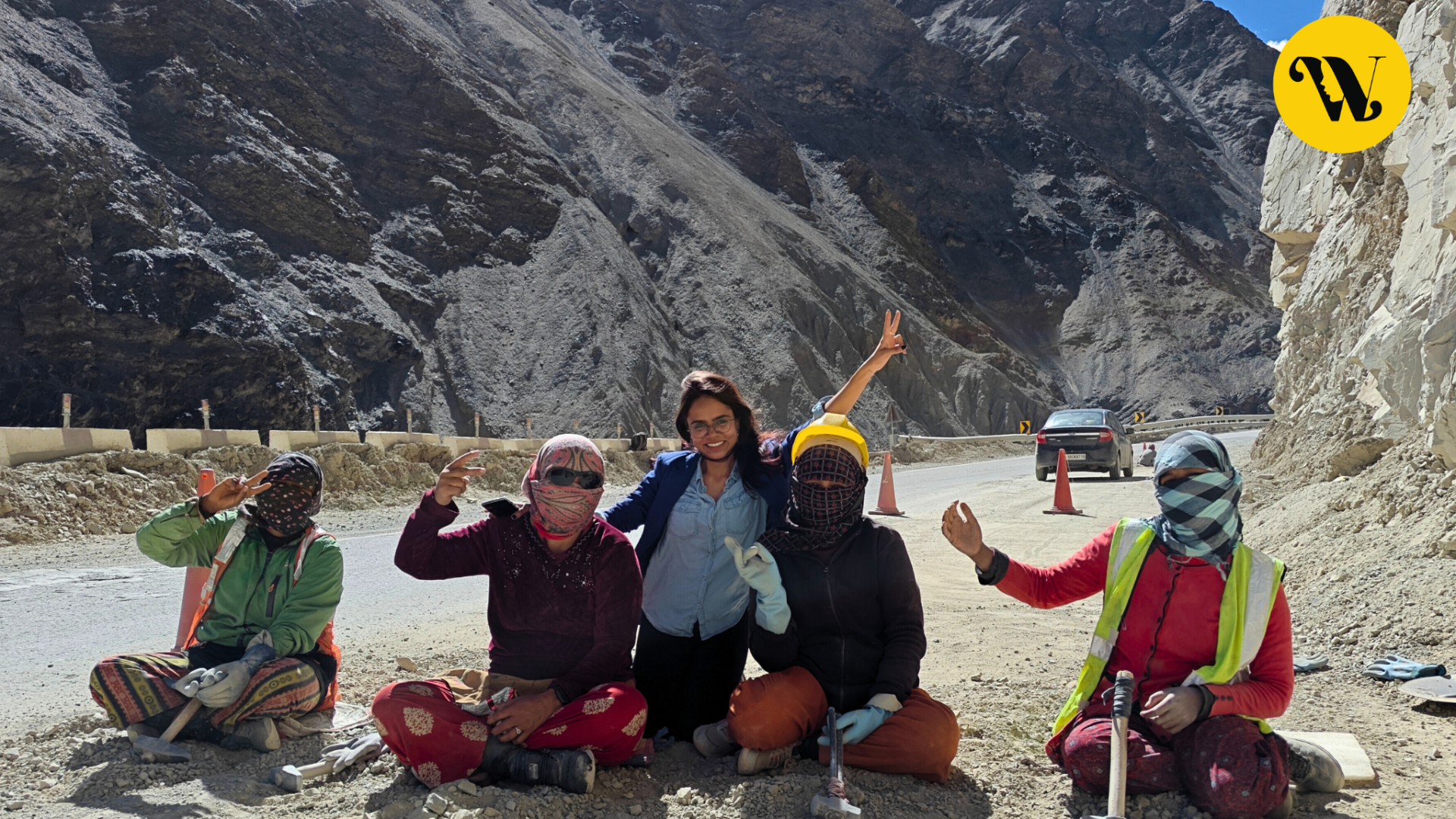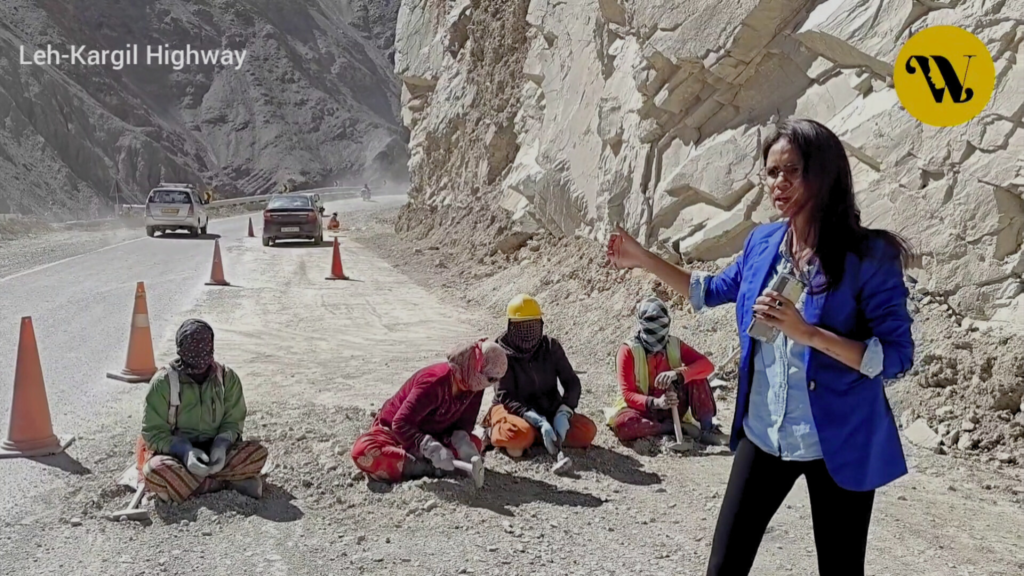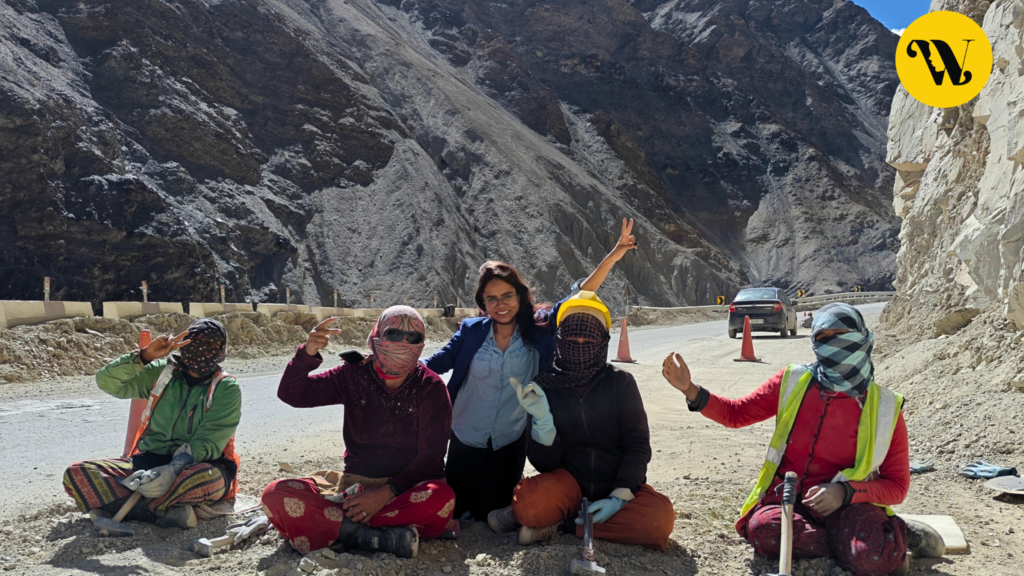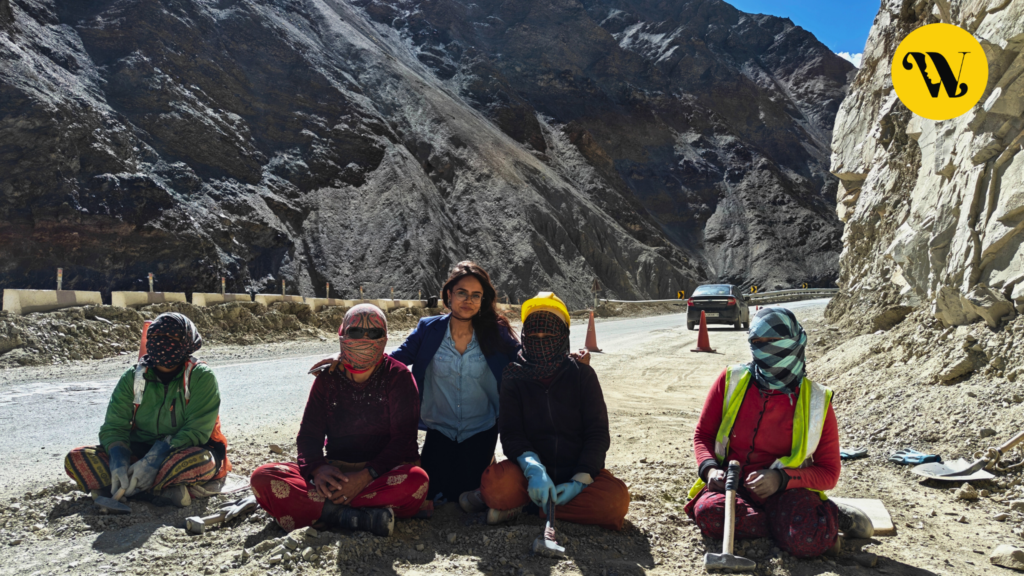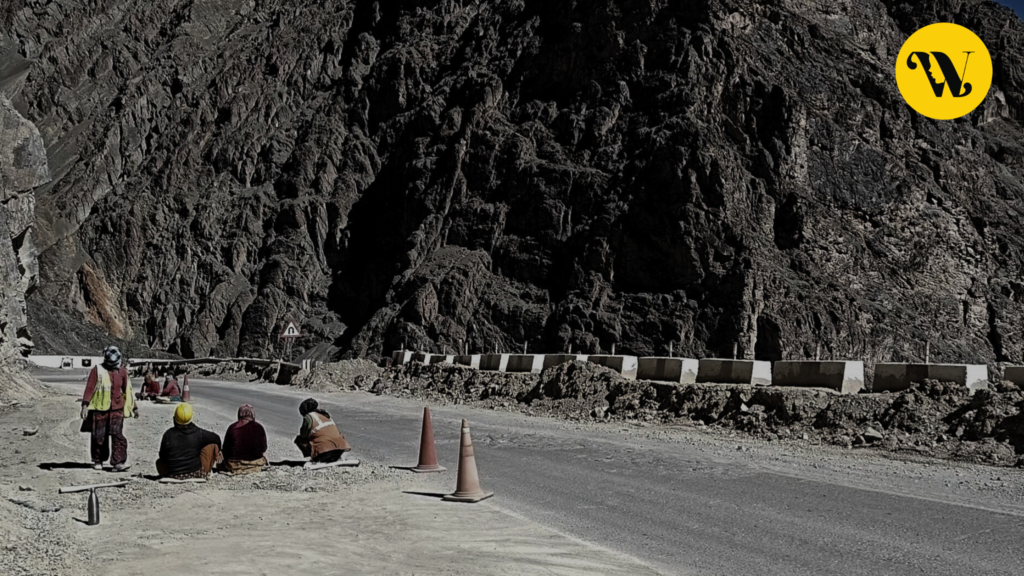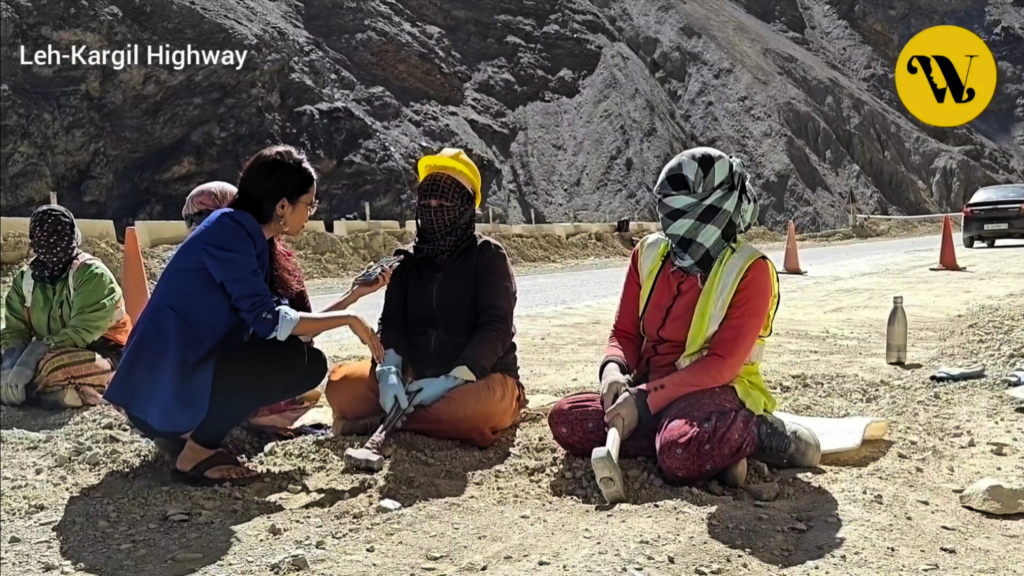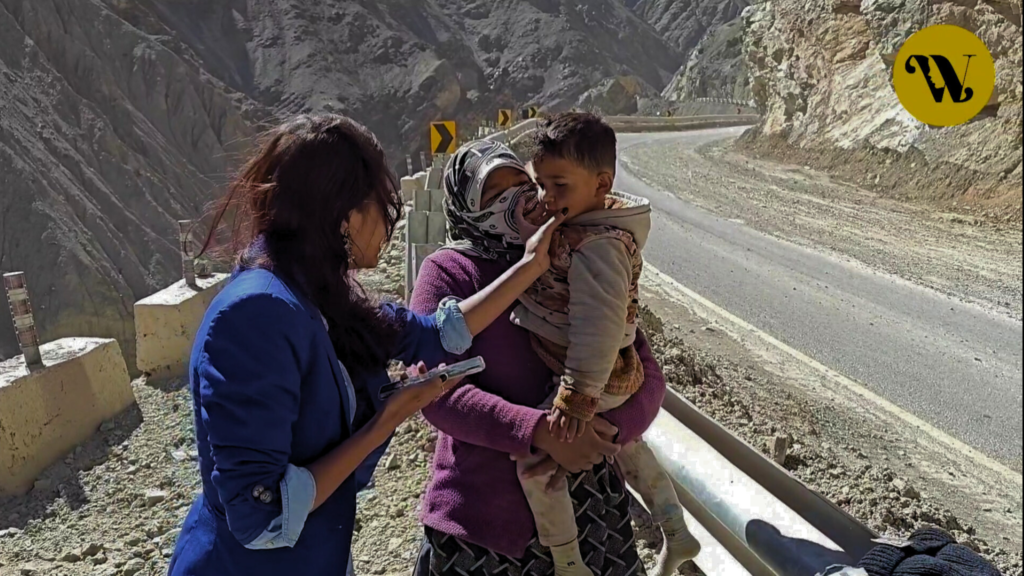By Kashish Singh
In the distant, dusty valleys of Ladakh, there sits a 2-year-old boy all alone with a dry & grubby face covered with a bedsheet tent along with a dupatta tied to his waist that prevents him from falling off the ridge & also from crawling to the middle of the Leh-Kargil highway, where on the other side, works his middle-aged mother as a construction laborer.
From the look of it, one visiting Ladakh to get lost in the serene beauty of the valleys thinks, ‘why is this little child sitting alone?’ His mother answers with utmost helplessness saying, “This is all that I can earn from to survive & feed this kid.”
This is a story coming from Ladakh that one doesn’t expect out of the sublime expanse of scenic landscapes – this is a story of women construction workers working at about 13500ft above sea level, under extreme climate conditions.
Trailblazers in the Winding Roads
As we passed Leh and started driving towards Kargil, in the middle of the narrow highway we saw 10-12 women with their faces covered with stoles, clearing debris with hammers spread on the side of the roads. To our curiosity, we stopped to engage in a conversation with these women road builders who were working at a place that is a high risk when it comes to landslides & climatic conditions. The intense weather conditions lead to frequent landslides, cloud bursts & a six month-long season of heavy snowfall making the work-execution very demanding.
These women forge paths & ensure smooth traffic movement on one of the country’s highest motorable roads, thus playing an active role in nation-building, but their work goes unnoticed. In far-flung areas of Ladakh, they aren’t there for some adventure trips like the majority of us, but they are there to build their children’s future, to earn a livelihood, and to cut it short they are there at 13500 feet for basic survival.
These women work under the Border Roads Organization (BRO) and fall under the category of the unorganized laborers. They are involved in unskilled manual jobs like carrying cement, and sand & breaking stones, and digging and clearing snow from the roads.
We spoke to these women at length about their experience as road builders & their everyday hardships & perspicuously what it’s like to be a woman in a job that requires a lot of strength & resilience.
“We catch cold & fever easily and when it’s not that we have an injury to attend to.”
Anita has been working on the Leh-Kargil highway for 5 years now, she comes from Nepal like the rest of the women working there. When asked about her family, with a hangdog face she replies, “Parents are in Nepal, I along with my husband & children are here, we live nearly 30 km away from the site. A vehicle sent by the Contractor comes to pick us up at 7 am in the morning and then we work for straight 12 hours through the day in these dusty valleys.”
While speaking about the challenges that they face while working on the side of the highways that on one side has high mountains & on the other – a chasm, she talks further, “Because of the altitude, oxygen level drops and it gets difficult to breathe while working & dust makes it a lot more difficult for us to function, which is why we have to cover our faces all the time while working.”
Precariousness & discomfort are something that these ladies deal with on an everyday basis. Another construction worker Sheetal says, “We catch cold & fever easily given the conditions we work in and when it’s not that we have an injury to attend to, these injuries are often caused by landslides, cloud bursts & sometimes from the equipment we work with.”
Women workers get injured & fall sick several times with minimal access to regular health checkups. In conversation with Chinimaya, another worker, she narrates an incident of a cloud burst that led to stones dropping from the mountaintop on the site where they were working at the moment and had led 2-3 women workers injured. When asked about the aftermath of the accident she goes on to say, “We get a day’s leave, and our hospital bills are taken care of by the Contractor, but apart from that if we take leaves any further our attendance gets affected and we don’t get paid for that particular day.”
These women also work when on periods, with no access to washrooms at the site. Sheetal murkily says, “The time we are on periods it gets really difficult but there’s nothing we can do about it, we can’t lose two days’ pay, that will make a huge difference in our monthly budget management.”
“We are not educated so will have to work on roads for survival”
With her face wrapped in a pink stole, Tara says, “Didi we aren’t educated enough to be able to take up big jobs, so we will have to work on roads for our children to not grow up like us. We have lived our life, we can’t go back and change things for us now, what best we can do is not let our children live the life that we lived and face the hardships that we are facing.”
These women aspire to provide their children with the best possible education and get them into big jobs. They pay for their children’s education.
We enquired about the wages that they get for working in such tough situations, 12 hours a day all around the year with changing seasons. To which women replied that they get 18,370 rupees per month. According to them, it is not enough to provide their house in a full-fledged manner & also given the sort of work and exposure to a lot of toxins. They feel their wages should be increased. It gets difficult for them to cope with the rising cost of living.
When asked about why these women are here in Ladakh from Nepal to work as construction workers, a relatively young woman, Tara says, “In Nepal, the wages we get are nothing, which is why the absolute dearth of options brought us here – miles away from our home to work in a cold deserted area like Ladakh.”
Women laborers working on the Leh-Kargil highway are appointed by Border Roads Organization contractors and have not been provided with any paperwork/written contract. It puts them in an even more vulnerable situation vis-à-vis their job. If one day a contractor decides to put some women off work, that can be done easily since there’s no binding contract concerning the tenure of their work.
Now, the Central Government has taken a step forward and announced an increase in the minimum wage rates for workers with effect from October 1, 2024. This notification was issued on 26th September, 2024.
Under this new notification minimum wage rates for workers in construction, sweeping, cleaning, loading, and unloading for unskilled work will be Rs. 783 a day (Rs. 20,358 per month) for semi-skilled Rs. 868 a day (Rs. 22,568 per month) for skilled, clerical, and watch and wards without arms Rs. 954 a day (Rs. 24,804 per month) and for highly skilled and watch and ward with arms Rs. 1,035 a day (Rs. 26,910 per month).
This new regulation comes as a hope for these women that their wages might increase with the effect of this step by the Central Government. These women workers have no union to fight for their basic rights like timely regulation of wages.
Not Just Roads, These Ladies Are Building Lives
These women have some things in common apart from their destinies & hardships – all of them are from Nepal but met for the first time in Ladakh when they came to work here & now have become more of a family than friends. All of these ladies had problems like constant hair fall & skin diseases but now they have made acquaintance with these problems. These women have built a life that works for them & pays the bare minimum bills, but they are happy that at least they can send their children off to schools.
It takes a lot more than mere courage to tie one’s child with a dupatta on the side of a busy narrow highway at 13500 ft. In conversation with the child’s mother, she goes on to say, “It’s just the two of us here so I can’t leave him anywhere, so I bring him to the site every day, make sure he’s properly hooked at the side of the road, right behind the safety railing and then I cross the road to work for the entire day. He just sits there and observes me for the entire day.”
These women are not just building roads but are trying to construct a better life for their children. As the dust settles off their faces there comes another day filled with challenges on the terrain and they take it head-on.
But the real question is – are we focusing enough on the unorganized sector workers, especially women working under such tough situations? Women spoke to us about the time when the valley was covered with snow and they still worked there in freezing temperatures, they clear the roads for easy transportation & they will continue to do so.
We continued on our journey but my mind kept wandering off to the face of that little boy, alongside a dusty road. What games does he play, what friends does he have, what dreams does he dream and what will he grow to be?


